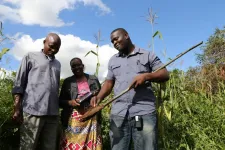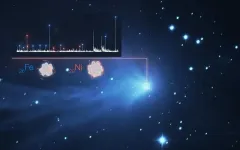'Postcode lottery' of nutrient intake from crops revealed in new study
2021-05-19
(Press-News.org) The amount of nutrients people get from the crops that they eat is a type of 'postcode lottery', according to new research that has analysed thousands of cereal grains and soils as part of a project to tackle hidden hunger in Malawi and Ethiopia.
A global team led by the University of Nottingham and its Future Food Beacon including academics and researchers from Addis Ababa University (AAU) in Ethiopia and Lilongwe University of Agriculture and Natural Resources (LUANAR) in Malawi, working on the GeoNutrition project, have discovered more about the relation between soils, crops and micronutrient deficiencies among people living there. Their findings have been published today in the journal Nature.
The team analysed the grain of more than 3000 cereal crop samples from farmers' fields in Ethiopia and Malawi. They found that the amount of the dietary micronutrients calcium, iron, selenium, and zinc in the cereal grain varied substantially with location, with some areas showing much lower levels of micronutrients than others. Some cereal types, such as millets, are more nutritious than others, such as maize. However, whether deficiencies are likely in an area also depends on its soils and landscapes.
Micronutrients include the vitamins and minerals which the body requires from the diet in small quantities, for a range of functions. Micronutrient deficiencies, also known as hidden hunger, are common globally, affecting more than half of children younger than 5 years of age, especially where access to sufficient food from plant and animal sources that are rich in micronutrients is limited for socioeconomic reasons. Micronutrient deficiencies pose a serious risk to human health, including the growth and cognitive development of children and susceptibility to infectious and non-communicable diseases.
This research shows that location is intrinsically linked to the nutritional quality of diets. Getting enough micronutrients is a type of 'postcode lottery' with nutritional value varying by location. This will particularly affect rural households who consume locally sourced food, including many smallholder farming communities where location may even be the largest influencing factor in determining the dietary intake of micronutrients.
The project was funded primarily by the Bill & Melinda Gates Foundation, led by Martin Broadley, Professor of Plant Nutrition in the School of Biosciences and a contributor to the Future Food Beacon. He said: "It is important to have good quality evidence on the nutritional quality of diets if we are going to support public health and agriculture policies to improve peoples' health and wellbeing. Mapping the quality of diets is an important part of this evidence".
The co-lead authors of the paper are Dr Dawd Gashu, working in the Centre for Food Science and Nutrition at AAU, and Dr Patson Nalivata, in the Department of Crop and Soil Science at LUANAR. Dr Gashu said, "Nutritional surveillance work on the quality of staple cereals is an important part of wider public health policies to address micronutrient deficiencies and we hope that this type of work is now adopted in more countries". Dr Nalivata said, "By learning more about how the nutritional quality of cereal grains is linked to soil types and landscapes, as we have in this study, we are now better able to advise farmers how to choose and cultivate more nutritious crops".
INFORMATION:
Other partners in this project include agricultural scientists, nutritionists, statisticians, ethicists and economists from the London School of Hygiene & Tropical Medicine (LSHTM), Rothamsted Research and British Geological Survey (BGS) in the UK. International partners include College of Medicine (University of Malawi), International Maize and Wheat Improvement Centre (CIMMYT), International Crops Research Institute for the Semi-Arid Tropics (ICRISAT), and the World Agroforestry Centre (ICRAF).
The investment from the Gates Foundation was supported by projects funded by the UK Government via the UKRI's Global Challenges Research Fund (GCRF), the Royal Society, the Foreign, Commonwealth and Development Office (FCDO), and the Biotechnology and Biological Sciences Research Council (BBSRC).
[Attachments] See images for this press release:

ELSE PRESS RELEASES FROM THIS DATE:
2021-05-19
HERSHEY, Pa. -- Parkinson's disease is the second most common neurodegenerative disease and affects more than 10 million people around the world. To better understand the origins of the disease, researchers from Penn State College of Medicine and The Hebrew University of Jerusalem have developed an integrative approach, combining experimental and computational methods, to understand how individual proteins may form harmful aggregates, or groupings, that are known to contribute to the development of the disease. They said their findings could guide the development of new therapeutics to delay or even halt the progression of neurodegenerative diseases.
Alpha-synuclein ...
2021-05-19
A new study by a Belgian team using data from the European Southern Observatory's Very Large Telescope (ESO's VLT) has shown that iron and nickel exist in the atmospheres of comets throughout our Solar System, even those far from the Sun. A separate study by a Polish team, who also used ESO data, reported that nickel vapour is also present in the icy interstellar comet 2I/Borisov. This is the first time heavy metals, usually associated with hot environments, have been found in the cold atmospheres of distant comets.
"It was a big surprise to detect iron and nickel atoms in the atmosphere of all the comets ...
2021-05-19
Where you live may predict your long-term survival after experiencing a first heart attack. Socioeconomic factors -- such as income, education, employment, community safety and more -- have long been associated with cardiovascular health, but less is known about how neighborhood factors impact outcomes after myocardial infarction (MI), particularly among younger individuals. In an article published in JAMA Cardiology, researchers from Brigham and Women's Hospital and colleagues studied the health records of 2,002 patients who experienced an MI at or before age 50. They found that even after adjusting ...
2021-05-19
What The Study Did: Researchers evaluated racial and ethnic diversity among obstetrics and gynecology, surgical and nonsurgical residents in the United States from 2014 to 2019.
Authors: Claudia L. Lopez, M.D., of the University of California, Davis, is the corresponding author.
To access the embargoed study: Visit our For The Media website at this link https://media.jamanetwork.com/
(doi:10.1001/jamanetworkopen.2021.9219)
Editor's Note: The article includes funding/support disclosures. Please see the article for additional information, including other authors, author contributions and affiliations, conflict of interest and financial disclosures, and funding and support.
# ...
2021-05-19
What The Study Did: Registry data were used to examine the association between living in a socioeconomically disadvantaged area and long-term survival among patients who had their first heart attack at or before age 50.
Authors: Ron Blankstein, M.D., of Brigham and Women's Hospital in Boston, is the corresponding author.
To access the embargoed study: Visit our For The Media website at this link https://media.jamanetwork.com/
(doi:10.1001/jamacardio.2021.0487)
Editor's Note: The article includes conflict of interest disclosures. Please see the articles for additional information, including other authors, author contributions and affiliations, conflicts of interest and financial ...
2021-05-19
What The Study Did: This study looked at the use of consumer digital information for COVID-19 control U.S. adults consider to be acceptable and the factors associated with higher or lower approval of using this information.
Authors: David Grande, M.D., M.P.A., of the University of Pennsylvania, is the corresponding author.
To access the embargoed study: Visit our For The Media website at this link https://media.jamanetwork.com/
(doi:10.1001/jamanetworkopen.2021.10918)
Editor's Note: The article includes conflict of interest and funding/support disclosures. Please see the article for additional information, including other authors, author contributions and affiliations, conflict of interest and financial disclosures, and funding and support.
# # #
Media advisory: ...
2021-05-19
What The Study Did: SARS-CoV-2 seropositivity wasn't associated with low levels of vitamin D independently of other risk factors.
Authors: Yonghong Li, Ph.D., of Quest Diagnostics in San Juan Capistrano, California, is the corresponding author.
To access the embargoed study: Visit our For The Media website at this link https://media.jamanetwork.com/
(doi:10.1001/jamanetworkopen.2021.11634)
Editor's Note: The article includes funding/support disclosures. Please see the article for additional information, including other authors, author contributions and affiliations, ...
2021-05-19
What The Study Did: Clinical characteristics and outcomes of patients with multisystem inflammatory syndrome among adults with laboratory-confirmed SARS-CoV-2 infection at a single U.S. medical center are described in this study.
Authors: Giovanni E. Davogustto, M.D., of the Vanderbilt University Medical Center in Nashville, Tennessee, is the corresponding author.
To access the embargoed study: Visit our For The Media website at this link https://media.jamanetwork.com/
(doi:10.1001/jamanetworkopen.2021.10323)
Editor's Note: The article includes conflicts of interest and funding/support disclosures. Please see the article for additional information, including other authors, author contributions and affiliations, conflict of interest and financial disclosures, ...
2021-05-19
What The Study Did: Racial and ethnic representation among departmental chairs and faculty in academic medicine in the United States from 1980 to 2019 was examined in this study.
Authors: Darrion Mitchell, M.D., Ph.D., of the Ohio State University James Cancer Center in Columbus, is the corresponding author.
To access the embargoed study: Visit our For The Media website at this link https://media.jamanetwork.com/
(doi:10.1001/jamanetworkopen.2021.10726)
Editor's Note: The article includes conflicts of interest disclosures. Please see the article for additional information, including other authors, author contributions and affiliations, conflict of interest and financial disclosures, and ...
2021-05-19
Philadelphia, May 19, 2021 - A multidisciplinary team of researchers from Children's Hospital of Philadelphia (CHOP) and the Perelman School of Medicine at the University of Pennsylvania (Penn) showed how the "batteries" of cells are highly implicated in whether patients with the chromosome 22q11.2 deletion syndrome develop schizophrenia. The results of the study may eventually lead to targeted prevention and treatment strategies for patients with the condition.
The findings were published today in JAMA Psychiatry.
22q11.2 deletion syndrome (22q) is ...
LAST 30 PRESS RELEASES:
[Press-News.org] 'Postcode lottery' of nutrient intake from crops revealed in new study

